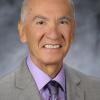
People pack a room at the St. Juan Diego Migrant House, a shelter and sanctuary for travelers, in the Tultitlán suburb of Mexico City, in 2011. (CNS/Keith Dannemiller)
 JESUS WAS A MIGRANT
JESUS WAS A MIGRANT
By Deirdre Cornell
Published by Orbis Books, $20
In early January, my California hometown newspaper, the Santa Barbara News-Press, printed the headline "Illegals line up for driver's licenses." The newspaper has historically used the terms "illegals" and "illegal alien," but to see it in such a bold headline was too much for me.
I wrote a letter to the editor, which was printed. I pointed out that while the newspaper had the right to use whatever term it wanted for Mexican immigrants here without documents, in my opinion, the term "illegal alien" is a demeaning and dehumanizing term for mostly hard-working immigrants. I noted the contradiction that the paper did not call employers of undocumented immigrants "illegals" even though they also are breaking the law. I concluded by stressing that no one was "illegal" in the eyes of God and that we are all children of God.
In a sense, this is what Deirdre Cornell's book Jesus Was a Migrant is all about. In a series of personal and biblical reflections, she, in a very moving way, reminds us that we are all migrants and that our basic Judeo-Christian beliefs are heavily based on the themes of exile and migration -- beginning with Adam and Eve as the first migrants. The exodus and diaspora are central to Judaism. Joseph, Mary and the baby Jesus -- in their search for shelter and in their retreat into Egypt to avoid persecution -- qualify as refugees and migrants.
Cornell brings these traditions and beliefs into her own life. She and her husband have ministered to migrant Mexican farm-working families by aiding in their personal and economic problems. They also worked in a health clinic in southern Mexico for three years and came to understand the poverty and lack of opportunity that drove many to become migrants to the United States.
In her work with immigrants in the agricultural areas of upstate New York, Cornell writes that she and the migrants experienced a deepening of their faith. Self-sacrifice is part of the Catholic faith, she reminds us, and, despite many hardships, we are all strengthened by sacrificing and helping each other, rather than just thinking of ourselves.
Migration, according to Cornell, is a source of blessing. Yet historically and today, immigration has been a divisive issue in the U.S., as the example of the Santa Barbara newspaper emphasizes. We tell ourselves we are a nation of immigrants, but we have also disliked and even hated many immigrants.
Of course, some Americans forget that their families have also been immigrants and internal migrants within this country. They forget or don't know how horribly many of their immigrant ancestors, such as the Irish, Italians, Poles, and other Eastern and Southern Europeans, were treated. Today, globalization and the unequal distribution of wealth among countries have only created new exiles as well as economic and political refugees. These are the causes of the human mobility that Cornell notes throughout her book.
Cornell's book is inspiring and useful because it reminds us not only that we, for the most part, are all historical migrants, but that we are also religious migrants, in that much of our faith is centered on the migration tale. By recognizing both the secular and religious basis for migration, Cornell hopes, we can come together and see God in each other.
She writes, "The most fundamental plot of sacred scripture, salvation history, unfolds through stories of migration. With all its hardships, human mobility serves as a paradigm of religious faith. Christians espouse belief in a Savior who embodied migration in his lifetime -- and who continues to cross borders as the risen Lord. In migration, we find a source of blessing."
I strongly recommend Cornell's thoughtful book of reflections on the religious roots of human migration written in a very accessible style of personal stories and faith reflections.
[Mario T. García is a professor of Chicano studies and history at the University of California, Santa Barbara.]




